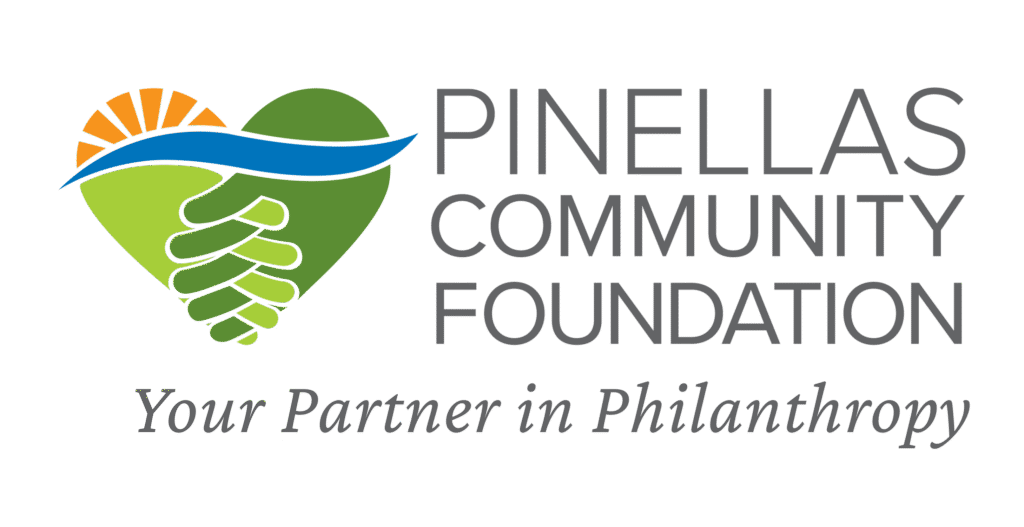As part of the See What’s Needed Now series, PCF CEO Duggan Cooley interviewed grantee Bridgette Heller of the Shirley Proctor Puller Foundation. They discussed the need for educational reinforcement for African American children in our community, the shift in education following the pandemic, and how PCF and SPPF are reviving education in Pinellas County.
Video Transcript
Duggan: Hi. I’m Duggan Cooley, CEO of the Pinellas Community Foundation, and this is “See What’s Needed Now.”
Duggan: Quality education in our community requires partnerships at all levels, from our school system to after-school and preschool programs to parents in the home.
Duggan: The pandemic showed us how challenging education could be and the need for innovation in education. But the need for innovation in education throughout the pandemic also showed us great disparities in our community when it comes to how our children access education and how successful they’ll be.
Duggan: Today, I’m joined by Bridgette Heller, the CEO of the Shirley Proctor Puller Foundation, to talk more about education in our community. And the Shirley Proctor Puller Foundation is a grant recipient from Pinellas Community Foundation.
Duggan: Thank you for joining us, Bridgette.
Duggan: Can you tell a bit about the history and the mission of the Shirley Proctor Puller Foundation?
Bridgette: Sure. Thank you for having me, Duggan. I’m happy to be here, and I’m thrilled to be a partner.
Bridgette: The organization started in 2014 after the passing of my mom, who had been an educator in the community for about 35 years.
Bridgette: She was convinced that the education of African American children, in particular, in the community had deteriorated over the period of the last 10-15 years. Then, the article called the “Failure Factories” happened, which really showed the data to support that hypothesis.
Bridgette: We got started to reverse that course, to try very hard to advance literacy in the community, and to help our children close the education gap — or the achievement gap in education.
Duggan: Thank you. What a wonderful tribute to your mom, as well.
Duggan: What are some of the greatest accomplishments of the Shirley Proctor Puller Foundation or education for our children in our community?
Bridgette: I think the biggest accomplishment, honestly, is around the community itself. We brought that conversation to the community. Now, people are talking about education within the community again.
Bridgette: I don’t think people had ever stopped talking about it, but people were talking about it more negatively. Now, I think people are talking about what we, as a community, can do to reverse the course.
Bridgette: We’ve had some major accomplishments with our little ones on bringing them to grade level. That’s always the biggest one.
Bridgette: My favorite story is around a little boy who had some struggles. We worked with the parents when he was in kindergarten and first grade.
Bridgette: Then, we got this call — I got this call — as he was driving home with his mom. They called me to tell me, and he started by saying, “I can read! I can read anything!”
Bridgette: That is your biggest joy when you see a child that has advanced to, say, first grade, and now he truly believes that he can read everything. And he was reading very well.
Duggan: That’s tremendous! Thank you for the work you’re doing to make that possible in our community.
Duggan: Can you tell us how working with the Pinellas Community Foundation helped prepare you to do some of the work that you’re doing in the community?
Bridgette: Yeah. I am happy you asked this question because you guys were one of our first supporters. I want to thank you for that. Because when you’re small and just starting out, you don’t often have the clout or the data behind you.
Bridgette: You guys were willing to work with us while we put that in place. I think data was the critical turning point for us. Giving us the time to work on getting that data in place and making sure we were assessing the students pre and post our services, making sure we were focused on the outcomes for the children, and helping us put together that whole impact story was what I credit you guys with helping us do.
Bridgette: It can be intimidating, as well, when you’re new to the not-for-profit space as I was — I came out of corporate. I had not done this, and it can be very intimidating to come into this space not feeling as though you have the years of social work behind you.
Bridgette: You guys welcomed me. You, particularly, opened your door and said, “Come tell us about your organization.” You came to the open house that we had that summer and saw it for yourself. I think that meant the world to us as a young up-start organization and gave us the confidence to keep going.
Duggan: I’m proud that we’re able to do that and have that kind of relationship with grantees, just like the Shirley Proctor Puller Foundation.
Duggan: I think it also comes full circle because now your organization is one that we highlight to others in the community as a successful grantee, as an organization that has clear outcomes that is able to demonstrate your success in the community not only through facts and figures and the data but also the stories that you’re able to tell.
Duggan: I think successful organizations in our community are able to pull both of those together. They’re not only what helps get the community involved in their work but those are also ingredients that help energize all the partners around the table to continue doing the work, which is often very difficult. But with the right ingredients, it can be very successful, as well.
Bridgette: I’m thrilled about that. I think that it has to be about the outcomes. It has to be about moving children forward. It’s wonderful to provide the books; it’s wonderful to provide many materials. But if those don’t result in moving the children forward, you have to be flexible, take a step back, and be agile enough to change the work you’re doing to drive those outcomes forward.
Bridgette: That’s what we’re extremely proud of within our organization, and you saw that actually as we moved through the pandemic. We were among the first to be able to go virtual. We were among the first to say, “OK. Our kids need computers,” … and thanks to you guys for providing those. We were able to get out into the community and ensure that our kids had access to education. I know it meant the world to our students, and I think it meant the world to the community.
Duggan: Thank you very much.
Duggan: Could you tell me, as we’re emerging from the pandemic and continuing to embrace virtual education and seeing some of the continued needs for our students, what do you think are some of the greatest needs in the realm of education for our children as we emerge from the pandemic?
Bridgette: One of the things that I think that we have to be focused on is helping children be independent learners. Given the pandemic, particularly now with people coming out of it, parents are busier than ever. They are trying to catch up. They’re still very stressed. There are still just all kinds of environmental stressors in terms of children.
Bridgette: Teaching them to calm themselves, to be focused, to know that they can be successful, and to give them the tools to drive that success on their own without necessarily a lot of parental oversight, I think, has been one of the biggest lessons that we’ve learned through the pandemic.
Bridgette: The teachers have also discovered this sense of connection again. It’s hard when you think about: how do you have a sense of connection through video? But we have been able to do that. I think that is one of the reasons that we were more successful during the pandemic than many others, just because we were able to do video and establish that strong sense of connection and community.
Duggan: I think that sense of connection is so important, and it’s been a challenge for many of us. Having a young child who embraced virtual education, I think one of the most exciting things for him in that entire experience was being able to see his teacher.
Duggan: For some of us that might have developed the Zoom fatigue, I think being able to see — even face-to-face virtually — for our children to see teachers and the people around them that they were so used to being a part of their world. Being able to see that, even on a screen, and make that connection was so important.
Duggan: Thank you very much.
Duggan: I want to thank Bridgette Heller of the Shirley Proctor Puller Foundation for joining us today as we talked about reviving education as we emerge from the pandemic.
Duggan: Pinellas Community Foundation started the Needed Now Fund as a response to our emergence from the pandemic and continuing community needs. If you find it in your heart to support the Needed Now Fund, visit us at PinellasCF.org.
Duggan: And that’s what’s needed now.
I always felt I wanted to serve the people in my community. Byron Smith
With this in mind, we asked Byron questions about his philosophy of charitable giving and how he learned so much about our community’s needs and giving opportunities.
Your gift can help provide educational support for our youth who are transitioning into a new way of learning while navigating the pandemic challenges.



